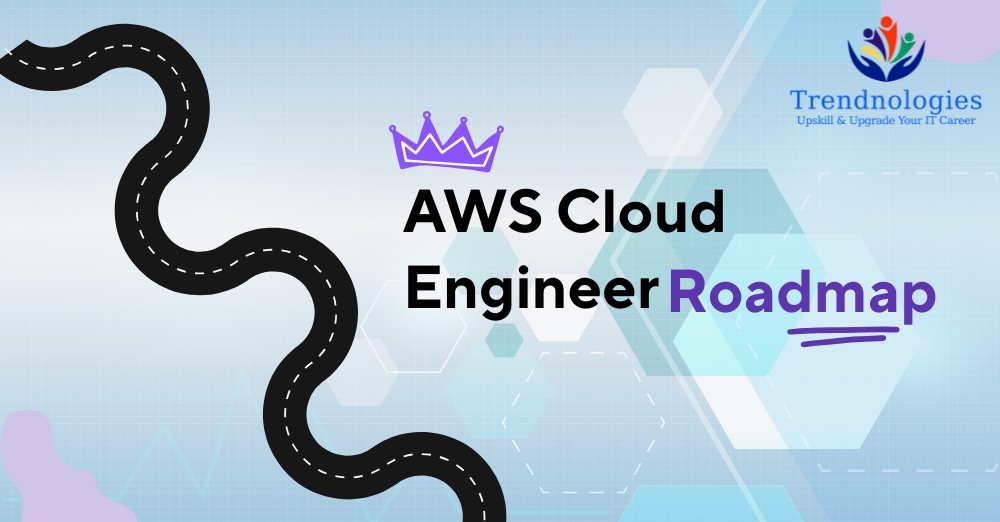AWS Cloud Engineer Roadmap:(Step-by-Step from Zero to Job)
Cloud computing has become the backbone of today’s digital world. From startups to tech giants, every company is moving to the cloud. Among all cloud platforms, Amazon Web Services (AWS) leads the market, creating thousands of high-paying career opportunities for cloud engineers.
If you’re starting from scratch and wondering how to land your first cloud job, this blog will guide you with a clear AWS Cloud Engineer roadmap—step by step, from zero knowledge to job-ready skills.
At Trendnologies, we help students and career switchers learn practical skills through real-time projects, interview training, and placement support. So, let’s dive in!

Why Choose AWS Cloud Engineering?
Before we start with the roadmap, here’s why AWS cloud roles are in demand:
AWS is used by 90% of Fortune 500 companies.
Cloud engineers earn an average of ₹6–12 LPA in India (and even more with experience).
Flexible career options: Cloud Architect, DevOps Engineer, Security Engineer, Data Engineer, and more.
The skill demand is growing rapidly across IT, finance, healthcare, and e-commerce industries.
Step 1: Understand the Basics of Cloud Computing
Every AWS Cloud Engineer roadmap starts with the fundamentals. You need to clearly understand:
What is cloud computing?
Benefits of the cloud (scalability, cost-effectiveness, flexibility).
Types of cloud models (Public, Private, Hybrid).
Basic concepts of storage, networking, and security.
Spend 1–2 weeks building this foundation before moving ahead.
Step 2: Get Familiar with AWS Core Services
AWS offers 200+ services, but as a beginner, focus on the most important ones:
EC2 (Virtual servers)
S3 (Storage)
RDS (Databases)
VPC (Networking)
IAM (Security and permissions)
Lambda (Serverless computing)
Tip: Don’t just read—practice. Create a free AWS account and try deploying small applications.
Step 3: Learn Linux, Networking & Scripting
To succeed as a cloud engineer, you need supporting skills:
Linux basics: File handling, permissions, package management.
Networking concepts: DNS, Load Balancers, VPNs, IP addresses.
Scripting: Bash or Python for automation.
These skills make you confident when working on real projects.
Step 4: Certification Path
Certifications help you stand out. The most popular ones in the AWS Cloud Engineer roadmap are:
AWS Certified Cloud Practitioner (Beginner)
AWS Certified Solutions Architect – Associate
AWS Certified SysOps Administrator – Associate
AWS Certified DevOps Engineer – Professional
You don’t need all at once—start with the Cloud Practitioner, then move up as you gain experience.
Step 5: Work on Real-Time Projects
Employers don’t just want theory—they need skills. Build small but practical projects such as:
Hosting a website on AWS EC2.
Creating a serverless app with AWS Lambda.
Setting up auto-scaling and load balancing.
Deploying a database on RDS.
At Trendnologies, our students practice with real-time projects, which boosts their confidence and resume.
Step 6: Build DevOps & CI/CD Skills
Modern cloud engineers often work with DevOps tools. Learn how to:
Use Git/GitHub for version control.
Set up Jenkins pipelines.
Work with Docker and Kubernetes for containerization.
Automate deployments on AWS.
These skills make you more job-ready.
Step 7: Prepare for Interviews & Soft Skills
Once you’ve built your technical skills, prepare for job applications:
Create a professional resume highlighting your AWS projects.
Practice cloud-related interview questions.
Focus on problem-solving and scenario-based questions.
Build communication and teamwork skills.
At Trendnologies, we provide mock interviews and 100% placement support so you’re fully prepared.
AWS Cloud Engineer Roadmap: Quick Checklist
Here’s a simplified roadmap for quick reference:
✅ Learn Cloud Basics
✅ Master AWS Core Services
✅ Practice Linux, Networking & Scripting
✅ Earn Certifications
✅ Build Real-Time Projects
✅ Learn DevOps Tools
✅ Prepare for Interviews
Final Thoughts
Becoming an AWS Cloud Engineer isn’t about rushing—it’s about building step-by-step skills. Follow this AWS Cloud Engineer roadmap, stay consistent, and practice regularly. Within a few months, you can transform from beginner to a cloud professional with high-paying opportunities.
At Trendnologies, we guide students through this journey with hands-on training, real projects, and placement support in top IT companies.
Ready to Start Your Cloud Career?
Don’t just dream about working in the cloud—make it your career today. Join Trendnologies’ AWS Cloud Training Program and become job-ready in just 60 days with practical projects, expert guidance, and guaranteed placement support.
Enroll now and start your cloud journey with confidence!
FAQs About Python Developer Skills
With consistent learning, you can become job-ready in 4–6 months.
Basic scripting (Python or Bash) helps but isn’t mandatory at the start.
Not mandatory, but certifications like AWS Solutions Architect boost your chances.
Yes! Many freshers start directly after training and projects.
AWS dominates the market and offers more job opportunities.
Yes, basic Linux is highly recommended for managing cloud servers.
Freshers usually earn ₹4–6 LPA, and experienced engineers can earn ₹12 LPA or more.
Focus on EC2, S3, RDS, VPC, IAM, and Lambda.
No, even non-IT professionals can switch to AWS with proper training.
At Trendnologies, we offer real-time projects, interview prep, and placement support to make you industry-ready.